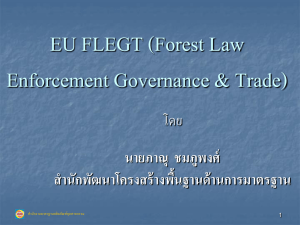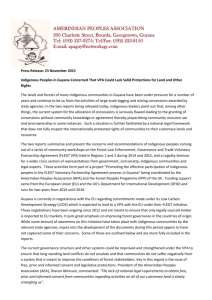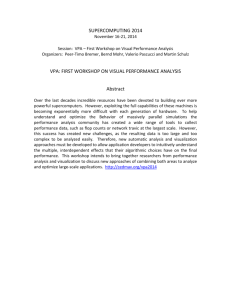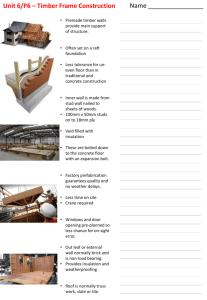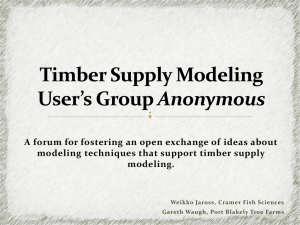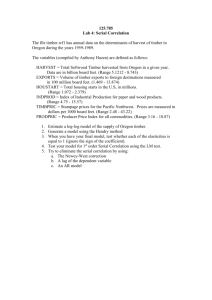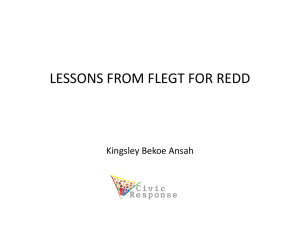Binh Dinh workshop report final
advertisement
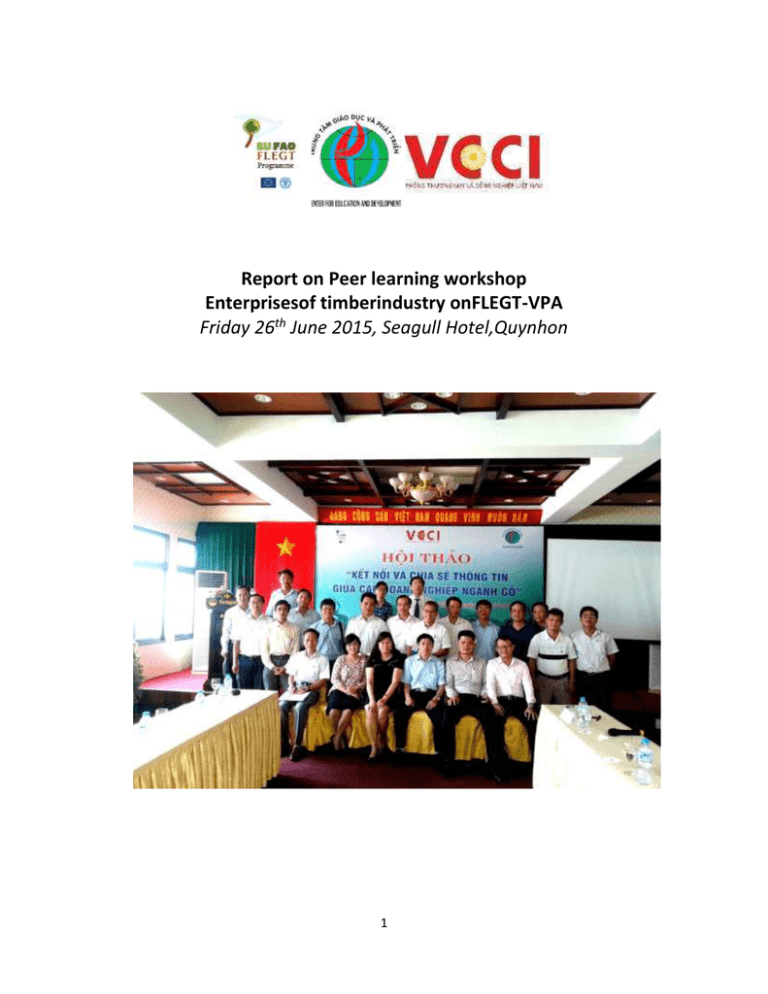
Report on Peer learning workshop Enterprisesof timberindustry onFLEGT-VPA Friday 26th June 2015, Seagull Hotel,Quynhon 1 The purpose of the Workshop Centre for Education and Development (CED) has workedwith VCCI Central branch and the Forest Products Association of Binh Dinh (FPA Binh Dinh) to organise a peer learning workshop. This workshop was for information sharing and networking (business to business, business associations and media representatives) and was held in Binh Dinh Province on issues related to the Voluntary Partnership Agreement on Forest Law Enforcement, Governance and Trade (FLEGT). The aim of theworkshop was to: “Increase the availability of FLEGT-related information through local media/journalists and business associations, to improve the understanding of the FLEGT negotiation process and VPA implementation, and to promote a more informed engagement of the business sector.” This was to be achieved through: Strengthening cooperation andnetworkingbetween NGOs/CSOs, andmediaagencies Updating information from VPA negotiation process anddiscussing the difficulties, opportunities and solutions Emphasising the role of businesses inproviding information to the community throughtraining and/or corporate social responsibility (CSR) or other cooperationinitiatives in the form of public-private partnerships Promoting cooperation, sharing and exchanging of information among CSOs (including associations) and other stakeholders to more effectively provide information to businesses Strengthening cooperation between business associations and industry associations: VIETFORES, FPA, HAWA and VCCI in helping businesses adapt to the FLEGTVPA businesses, associations, Workshop agenda: Update the VPA negotiation and timeline for signing VPA, pending issues and obstacles (VNFOREST) Update about the project and activities for supporting the private sector (Nepcon, WWF, and CED activities). Specific activities and updates of the project (review information packages, launching the web) Discuss difficulties and alternatives when moving the FLEGT process forward (strengthening information provision and cooperation according to value chains) – business perspectives Discuss how to promote the sustainable use of forests for timber processing industries (promote the use of domestic resources and reduce dependency on imported timber) – business insights How to encourage businesses to support communities (for families and small traders supplying materials for businesses) 2 Highlight the CSOs/NGOs roles in monitoring the implementation of VPA Workshop presentations: Mr. Vu Anh Minh gave the presentation: "Update on project activities and results – regarding communication and information for businesses and the role of business associations in the FLEGT process" Mrs. Nguyen Tuong Van, chief of FLEGT & Lacey from the General Directorate of Forestry gave a speech on “updates on the FLEGT VPA negotiations between VN-EU and issues related to businesses” Mr Le Vy, deputy chairman of the Association of Binh Dinh wood gavea presentation about “Timber Industry in Binh Dinh before implementing VPA” Ms To Kim Lien, director of CED gave a presentation on “Corporate Social Responsibilities - CSR - in the timber processing industry” The Participants of the Workshop The participants of the workshop included: Representatives from VNForest and the Forest Protection Department Wood Business Associations in Binh Duong, Ho Chi Minh City, Binh Dinh Nearly 50 wood enterprises from Ho Chi Minh City, Binh Duong, Phu Yen, Binh Dinh, Quang Nam and Da Nang city Mr Nguyen Dien – Vice-chairman of the VCCI Ms. Nguyen Tuong Van, Head of Lacey and FLEGT brand in Da Nang executive office at MARD, provided updates 3 about FLEGT negotiations Mr Le Vy – Deputy-chairman of the Association of Binh Dinh Wood Ms To Kim Lien, Director of CED . Video introduction about FLEGT and the project’swebsite Two short clips (each clip is 3 minutes) were shown to introduce: the FLEGT-VPA business and community initiative the projectwebsite (flegtvpa.com) the project forum "FLEGT-VPA FAQs for wood Enterprise" Discussion about: Measures to promote the sustainable use of forests Measures to enhance cooperation and thesharing of information between enterprises and stakeholders The role of businesses within the community in the use of legal timber. Mr Nguyen Dien and Ms To Kim Lien led the discussion 4 Mr Nguyen Liem(Member of Binh Duong Wood Association) It is clear that the Government should be involved in VPA to avoid risks for businesses. However, Enterprises still see some problems. It is not difficult to obtain a CO for legal timber, but will the license be fair? Will licensing be by individual shipment, batches, or annual back subtraction? Currently, it is licensed under the shipment. This is extremely difficult for businesses because in the documents it states that the FLEGT license into the EU must take place through a single point of entry, but a shipment may be transshipped through many entry ports. Which agencies will be in charge of licensing: Enterprises should be transparent. Cost issues are not major problems, but enterprises fear slow orders, so losses will be huge and customers could be lost. The classification of timber is also unclear. Actual production Exports: solving the buckled data. For example, a sudden change of requirements from customers will make enterprises adjust the quantity of products. Thus, should the data be provided to/by FLEGT before customs clearance or after customs clearance? After signing, there should be a period of time for businesses to test it. If it is beneficial, the business will certainly support it. It should also be online so businesses can adjust the quantity online; reducing travel time for businesses. Enterprises should obtain a FLEGT license from 3 to 7 days because it is very difficult if they only have a basic FLEGT license. Businesses must also be allowed customs clearance. How do we access the origin of timber for products made by combining wood with metal, plastic, plywood and other materials? It would not be feasible to have FLEGT licensesbefore customs clearance because after receiving the license issues may 5 Mr Nguyen Liem (Member of Binh Duong Wood Association) arise;for example, changes in the amount of products actually exported. When implementing the FLEGT license procedures, it will allow enterprises to supplement some vouchers later as for CO. Mr. Nguyen Phuc (Vice chairman of Binh Duong Wood Association): There should be continued negotiations. Because Vietnam and six other countries have negotiated for so long, The Association should gather comments and suggestions from businesses and send them to the Government. We need to also perfect the legal system of Vietnam. In case of continued negotiations, we should have a meeting with the 6 other countries first, in order to see what problems they have. The Ministry of Agriculture and Rural Development should be consulted from countries which signed VPA with the EU but have not yet been licensed for businesses. They should then consider whether to continue the negotiations. The classification of enterprises: Should a new enterprise which has just been established be classified type 1 or type 2? What are the criteria for classification? In our opinion, all enterprises should be classified in level A and after a year, enterprises which violate the terms will be relegated. Vietnam should build a legal wood system and advertise that importers of wood products from Vietnam can either accept and can ignore FLEGT/VPA. Enterprises should not be placed in type II at the beginning, they should be considered after two years if they did well. If they don’t violate anything, theyshould bein type I as intended by the VNForest. We should place them all in type I, and then if they have any violations orpoor performance of the legal provisions, we can relegate them to type II. Mr Nguyen Phuc (Vice chairman of Binh Duong Wood Association): 6 Mr Dao Tien Dung(HAWA): In recent times, we have perfected our legal system. The problem is not whether we can sign the VPA or not, but how we can make sure the system will help businesses in exporting and enhancing their images. Whether to continue negotiating and signing VPA or not, our timber export companies still have to comply with the provisions of relevant laws of Vietnam and without VPA, our enterprises have still exported wood products across the EU. Therefore, he suggested that Vietnam’s delegation should negotiate an equal position with no condescension and intransigence about the unfavorable terms for Vietnam enterprises. Mr Dao Tien Dung, Chief of staff of Hawa wood Association Mr Nguyen Hong Vinh (Director of Ling Giang Trade and Service Ltd): These companies already have FSC and COC Certifications of legal timber production, so should it have FLEGT license as well? Each year, enterprises have to spend $4,000 to apply for FSC certification, so it should not have FLEGT which causes further difficulties for businesses. 7 Should businesses have the FLEGT license when it already has FSC/Lacey? Should businessesdiscard FSC/Lacey when using FLEGT licenses? Mr Hai (Dai Thanh Company): Do businesses need a license or not because they give all necessary data for customers requirements by this time? CITES provides a license under the supervision of the 3rd European intermediaries. How does it affect businesses if CITES has a problem which could deprive them of a license? Mr Hai, Dai Thanh Wood Company Mr Truong Van Tai (Truong Thanh Wood Company): The main problem with VPA is common integration issues. If we do not integrate, we will be lagging behind the world. Not only that, it's a matter of ethics and the responsibility of enterprises for society. Enterprises have some suggestions of how to license more simply: the export enterprises that all have the CO certificate should integrate the FSC and CO requirements to reduce paperwork. If providing a license before customs clearance will cause difficulties for enterprises, we suggest that it should be done like a CO, because some customers require CO but some do not. Without 8 FLEGT, the customs clearance will still continue. If enterprises do well, new customers will join, thus enterprises willvoluntarily improve. Enterprises granted with CO (Certificate of Origin) will also be granted FLEGT licences because at the moment when an enterprise applies for CO they have to submit documents to agencies to prove their timber’s origin.Therefore, it will be convenient if these agencies will continue to grant FLEGT licenses provided that businesses have additional documents to prove timber legality. This will save time for businesses as they will get CO and FLEGT licenses at the same time. Businesses will have to get Cos regardless, so if these two processes are combined it will save time and money for businesses. The FLEGT should not be a requirement for customs clearance, it could be granted after custom clearance otherwise it will be very complicated for businesses and most businesses do not expect this situation. Timber materials from Tram (Melaleucacajuputi), xà cừ (Khayasenegalensis), rubber tree (Heveabrasiliensis), and acacia (Acacia auriculiformis) planted in Vietnam should be considered as legal timber as they come from plantations. Currently, these types of trees are not included in any legal documents. Mr. Truong Van Tai, representative from Truong Thanh Company 10.30-11.30am: Discussion sessions Ms. Nguyen Tuong Van (Head of FLEGT and lacy standing office, VNFOREST, MARD): 9 In this session, Ms. Van explained about the proposed process of granting FLEGT license. Whichtimber is legal, roles of monitoring, and enterprise classifications (All of these are subject to changes as it is still under negotiations). Shipment-based FLEGT licenses: It is now tentatively agreed between Vietnam and the EU that FLEGT licenses will be granted for each shipment first entering the EU market. FLEGT licenses should be presented at the first entry point to EU markets. At the moment, according to EUTR, shipments exported to EU markets have to conduct due diligence for the whole shipment. It is not finalized that FLEGT licenses will be granted before or after customs clearance. If the FLEGT licenses are granted after customs clearance, it is difficult to control the process. Businesses have questions: If there are differences between the quantity of real exports and quantity that the FLEGT licenses grant (for example: they expect to produce and export 1000 units of timber product but then they finalize only 800 and the rest will be shipped and exported later), do they have to apply for the remaining 200? And what would the process be? How will we ensure that the FLEGT licenses will be provided promptly for businesses to ensure it will not delay their operations? Businesses have to plan well in advance and it is expected that forest protection agency will provide clear guidance. Our system is based on post inspections;businesses will submit papers first and if there are any suspicions the forest protection officers will conduct inspection. Forest Protection officers will not check all the shipments. All businesses have to do is to submit papers to prove timber legality of the products. For example, if businesses expect to export the timber product in three days, they have to plan and submit paper three days in advance to ensure that they haveplanned well in advance. In the future, to be more convenient for businesses, the FLEGT licensing system is expected to connect with the online system of the customs office so they know the process. It is also expected that the licensing system will be online. The draft FLEGT license can be granted online for businesses’ custom clearance and the original hard copy will be sent to businesses afterwards to ensure that they can export their products on time as planned. It is forbidden to reject the FLEGT licenses granted by the Vietnamese authorities (CITES) unless VPA is invalid. It is also expected that the government will develop a system 10 with the network of business associations to ensure that businesses can provide feedback and log complaints to ensure transparency of the FLEGT licensing systems. Regarding questions about FSC certification and FLEGT licenses, the EU considers timber with FSC certificates as timber with low risk but this does not mean that the timber with FSC certificates are coming from legal sources. So even though FSC is a good system it is not accepted by EU as CITES and FLEGT licenses. Vietnam also makes use of this system;businesses that have FSC, COC will be classified as category I immediately. Timber from domestic sources without FSC is considered as illegal timbers: This is a wrong concept. FSC is one piece of evidence, and this is voluntarily conducted by independent NGOs and recognized internationally that forests are managed in a sustainable manner. While legal timbers are defined by national laws and regulations,this means that timber without FSC could be identified as legal. For example, timber is imported from Laos without FSC certificates; however, if they are exploited and processed according to Laos laws and regulations, these timbers are considered legal. Vietnam respects existing laws and regulations of other countries. In Vietnam, we have circular 01 and 35 for forest management. In the trends of higher prices of FSC timber, Vietnam is developing the sustainable forest management system of Vietnam; granting certificates of Vietnam based on the circular 38. Although the system is very slow, we hope we will have our own system similar to FSC. Regarding integration of the CO granting, in the future the system of CO will be subject to change when we sign TPP, so the CO system will also have to change. Similar to textile products, we will have to ensure that a proportion of materials come from Vietnam to benefit from TPP regulations. If we are going to buy timbers from nonTPP countries, we cannot grant CO for those products while exporting to TPP countries. We are negotiating that 60-70% materials from Vietnam will be granted CO from Vietnam. If the EU only recognize FLEGT, TPP only recognize CO, Vietnamese businesses will have to prepare two profiles - one for FLEGT and one for CO. However, enterprise should prepare for these changes, and organization systems should be developed and managed in a way that it could meet new requirements by producing different profiles based on one integrated management system. Companies should be proactive in improving their governance and management systems to meet these new changes in the future. Regarding questions on whether or not the FLEGT licenses can be granted after the custom clearance, all of the procedures and systems now are tentatively developed 11 to ensure that FLEGT license will not create problems and delays for business exports. We ask that business associations and businesses themselvesmake notes of the process and steps that the companies have to take from producing until export so we know the approximate time and definitive steps that businesses have to go through.Also, so we know howthe FLEGT licensing system can be introduced in most effective and efficient ways - we will consider proposals from businesses. Currently, businesses follow the circular 01,which means their products are legal. However, that is only on paper and you can see that their products are not labeled so when we look at certain products we do not know whether they are produced from legal timber. In the future, we are thinking about collaborating with associations to label Vietnamese timber products. After we have verification systems in place, and productscan be verified according to that system, we will label products as FSC. However, we will have to assesshow to ensure that the systems will be widely recognized as FSC. Newly established enterprises and companies will be classified as Category A. During the operation process if they violate regulations during their operations they will be downgraded. Previously, we were considering a third category for newly established businesses but then we decided that it was too complicated so we think the newly established businesses should be classified in category A. Mr Tran van Trien (Department for Forest Protection): Responded to businesses about questions on the role of the Forest Protection Offices to verify legal timbers and the classification of businesses? Forest Protection Offices is the agency to verify FLEGT licenses before granting them Before signing the VPA, the government would like businesses to prepare to comply with the three steps indicated in the chart below. 12 CHART – SUPPLY CHAIN CONTROL IN VPA 1. Legality Definition: Organizations and households 2. Establishment, verification, and approval of verifiers in each step of the supply chain 3. Internal inspection and monitoring Additional measures applied for companies exporting timber products to EU markets 4. Verification of compliance of organizations and households, including business classification based on risk assessment and verification 5. FLEGT Licensing SUPPLY CHAIN CONTROL National control system applied for all markets and businesses both domestic and export 6. Independent Evaluation The negotiation process takes time because the legal and governance context of two sides are so different. If problems arise when VPA is signed, the two sides will find solutions and the FLEGT license systems will continue as planned. In the current VPA, there will be six steps in the chart. If the businesses are compliant with the current laws and regulations, that means the first three steps are already guaranteed. Forest protection agencies will develop a toolkit to give guidance for business classification to minimize the human resources needed for this work. Based on this toolkit, the classification process will be fair and transparent. After two years, if the companies are compliant and they do not violate any principles defined in the Legal Definition (LD), they will be automatically assigned to category 1 (or A) which will be notified to CITES. The department of Forest protection at provincial level will be directly responsible for checking thebusinesses when needed. Forest Protection Agencies will only check or conduct inspection in special cases, to avoid wasting the time of businesses. The first three boxes are simple as they follow Vietnam’s laws and regulations. The three remaining boxes are new requirements when VPA is signed and must be implemented. The Department of Forest protection will only be responsible for forest products; theycannot beresponsible for all seven principles of LD. Therefore, enterprises will 13 follow existing requirements of laws and regulations relating to other issues; for example, taxes and labour. When the companies buy timber, you should ask for good evidence and documentation to make sure that you can prove timber legality. For imported timber, if there is clear evidence and documents to provide timber legality, it is not necessary to have them certified by forest protection offices. Timbers from natural forests are not allowed, so legal timbers will not be available. Largebusinesses will not buy confiscated timbers. It is very complicated to have three categories and we currently do not have toolkits for classifications. At the moment, the EU and Vietnam agreed that businesses are to be classified into two categories. Mr Tran van Trien– Department of Forest Protection Department Concluding the workshop. Mr Nguyen Dien (Deputy Director of VCCI Central Branch): Before concluding the workshop, Mr, Dien asked participants for their personal point of views -“Do you agree to continue to negotiate and sign VPA?”- Only 5 out of 50 participants raised their hands. 14 However, based on inputs and opinions from participants in the discussions, especially those from business associations, people did not raise their hands not because they think that VPA is not necessary, or that legal timbers and certification are not important to businesses. The main issues that businesses are now concerned with are that licensing procedures and systems will be complicated and officials in charge will create problems and corrupt the businesses, taking more time and costs, even affecting credibility of businesses due to delays in exporting. As a result, businesses will bear fines as defined in their contracts, and they could evenlose clients. All the concerns of businesses are understood because the reality is that the administrative reform process in Vietnam has happened very slowly. In addition, it increases administration in some areas and creates a lot of problems and incurs cost for businesses. However, with the responses from VNFOREST and FPD, we can expect simple and convenient systems and procedures for businesses in designing and implementing the FLEGT license systems. We all hope that businesses will not face many difficulties when FLEGTVPA is signed and goes to the implementation phase. Unlike EUTR, VPA will be based on Vietnamese laws and regulations, so it will be easier for businesses. Therefore, we propose to create favourable conditions for businesses when they apply for FLEGT licenses. We also propose that at the beginning, most businesses should be considered businesses in category 1 (A); the least time consuming for business. Businesses can apply and send the document online and we hope in the future the licenses can be granted online. The network of the licensing offices must be convenient for businesses to minimize the time for travel and transactions. Legal documents must be developed and adopted for governing timbers from Tram (Melaleucacajuputi), xà cừ (Khayasenegalensis), rubber tree (Heveabrasiliensis), acacia (Acacia auriculiformis), as well as fruit trees. These timbers must be considered similar to timber from plantations and they should be legal timbers provided that they have relevant papers Maybe at the beginning, it will be more complicated, but hopefully when the systems are in place and the FLEGT licensing system goes smoothly, it will be easier for businesses to conduct due diligence as required by EUTR at the moment. After this workshop, there may be lots of new information and changes after the next round of negotiations, so we propose VNFOREST continues to keep the businesses updated on its website or on the project website (http//flegtvpa.com)run by CED. In the context that other countries will also continue to ban logging in their natural forests because of stricter requirements on timber origins and legality, we propose that businesses and associations consider investing in plantations to ensure the timber resource materials for businesses. Policies can be used to invest in agriculture and rural 15 Decree 55/2015/NĐ-CP, dated 9/6/2015 on credit policies for agriculture and rural development and in investing in plantation in rural areas. 16 Conclusions 38 out of 43 participants (88%) filled out the assessment forms. And all 38 assessed that the quality of the workshop was very good, especially the discussions and responses from experts and speakers. Assessment after the workshop At the workshop, the Center for Education and Development (CED), which has implemented the project, also introduced FAQs handbooks about FLEGT-VPA (FAQ on FLEGT-VPA) to the participants, associations and forestry professors processing; as well as launching the website (http://FlegtVpa.com). This is the project's official website, the version running tests so far have had over 100 news/articles related to the activities of the project which have had over 6800 page views. The project’s fan page has reached over 900 “likes”. 17 Responses on the draft FAQ handbook on FLEGT-VPA issues Need assessment on the handbook FAQs handbook about FLEGT-VPA got the attention of businesses and many commented on the forum. 63% of participants attended the workshop registered for a hard copy of the document. They proposed to publish an online document on the website (http://FlegtVpa.com) for updating the program’s contents. 18 Media Coverage of the Workshop The workshop was well covered by the media with 5 media outlets publishing news and information about the workshop and FLEGT related issues between 26thJune and 15th July. More specifically, the following articles report about the workshop: Businesses should be more proactive in seeking information and enhance understanding about FLEGT/VPA with EU – VOV<http://vov.vn/kinh-te/doanh-nghiep-can-chu-dongtim-hieu-hiep-dinh-vpaflegt-voi-eu-411843.vov> Businesses should be more proactive in seeking DoanhnghiệpcầnchủđộngtìmhiểuHiệpđịnh VPA/FLEGT với EU – BáoQuảngNinh<http://baoquangninh.com.vn/kinh-te/201507/doanh-nghiep-can-chudong-tim-hieu-hiep-dinh-vpaflegt-voi-eu-2275945/> Businesses are reluctant to support the signing of VPA/FLEGT – BáoPhápluật<http://baophapluat.vn/phong-su-dieu-tra-ve-kinh-te/doanh-nghiep-goluong-lu-truoc-hiep-dinh-vpaflegt-223532.html> Vietnamese businesses are still vague about VPA/FLEGT – BáoDiễnđàndoanhnghiệp<http://enternews.vn/doanh-nghiep-trong-nuoc-con-lo-move-vpaflegt.html> The project on: improving carpenter careers (PPP): Connecting with businesses after training– E-newsletters of HAWA. News highlights 7/7/2015 của–Forestry Newsletters, The information pages of VNFOREST: <http://tongcuclamnghiep.gov.vn/diem-bao/diemtin-ngay-07-07-2015-a2586> 19
